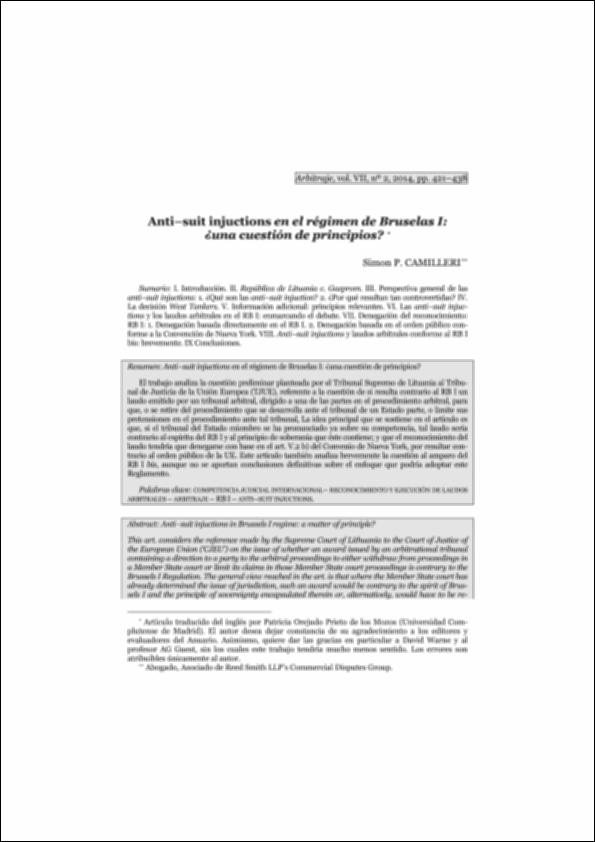Please use this identifier to cite or link to this item:
http://hdl.handle.net/10637/12694Anti-suit injuctions en el régimen de Bruselas I : ¿una cuestión de principios?
| Title: | Anti-suit injuctions en el régimen de Bruselas I : ¿una cuestión de principios? |
| Authors : | Camilleri, Simon P. |
| Keywords: | Competencia judicial internacional; Reconocimiento y ejecución de laudos arbitrales; International jurisdiction; Recognition and enforcement of arbitral awards; Arbitration; Brussels I Regulation; Anti-Suit injuctions |
| Abstract: | El trabajo analiza la cuestión preliminar planteada por el Tribunal Supremo de Lituania al Tribunal de Justicia de la Unión Europea (TJUE), referente a la cuestión de si resulta contrario al RB I un
laudo emitido por un tribunal arbitral, dirigido a una de las partes en el procedimiento arbitral, para
que, o se retire del procedimiento que se desarrolla ante el tribunal de un Estado parte, o limite sus
pretensiones en el procedimiento ante tal tribunal, La idea principal que se sostiene en el artículo es
que, si el tribunal del Estado miembro se ha pronunciado ya sobre su competencia, tal laudo sería
contrario al espíritu del RB I y al principio de soberanía que éste contiene; y que el reconocimiento del
laudo tendría que denegarse con base en el art. V.2 b) del Convenio de Nueva York, por resultar contrario al orden público de la UE. Este artículo también analiza brevemente la cuestión al amparo del
RB I bis, aunque no se aportan conclusiones definitivas sobre el enfoque que podría adoptar este
Reglamento. This art. considers the reference made by the Supreme Court of Lithuania to the Court of Justice of the European Union (‘CJEU’) on the issue of whether an award issued by an arbitrational tribunal containing a direction to a party to the arbitral proceedings to either withdraw from proceedings in a Member State court or limit its claims in those Member State court proceedings is contrary to the Brussels I Regulation. The general view reached in the art. is that where the Member State court has already determined the issue of jurisdiction, such an award would be contrary to the spirit of Brussels I and the principle of sovereignty encapsulated therein or, alternatively, would have to be refused enforcement under Art. V(2)(b) of the New York Convention on the basis that the award con-travened EU public policy. The art. also, briefly, considers the position under the Recast Regulation although no definitive conclusions are drawn as to the approach that is likely to be taken under that Regulation. |
| Description: | En: Arbitraje: revista de arbitraje comercial y de inversiones. eISSN. 2603-9281. vol. 7, n. 2, 2014, pp 421-438 |
| URI: | http://hdl.handle.net/10637/12694 |
| Rights : | http://creativecommons.org/licenses/by-nc-nd/4.0/deed.es |
| Issue Date: | 1-Sep-2014 |
| Appears in Collections: | 2014 Arbitraje nº 2 |
Items in DSpace are protected by copyright, with all rights reserved, unless otherwise indicated.


